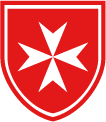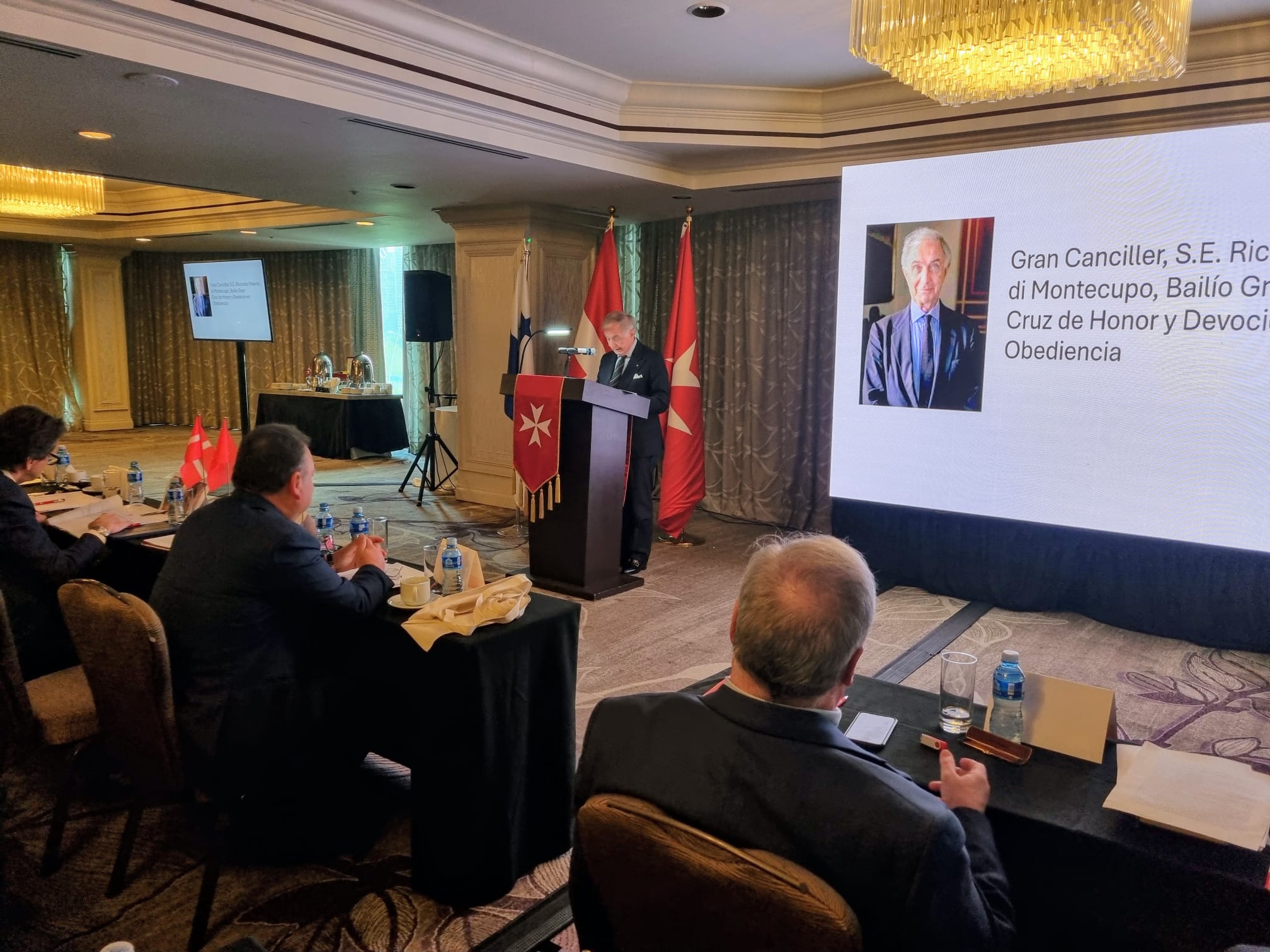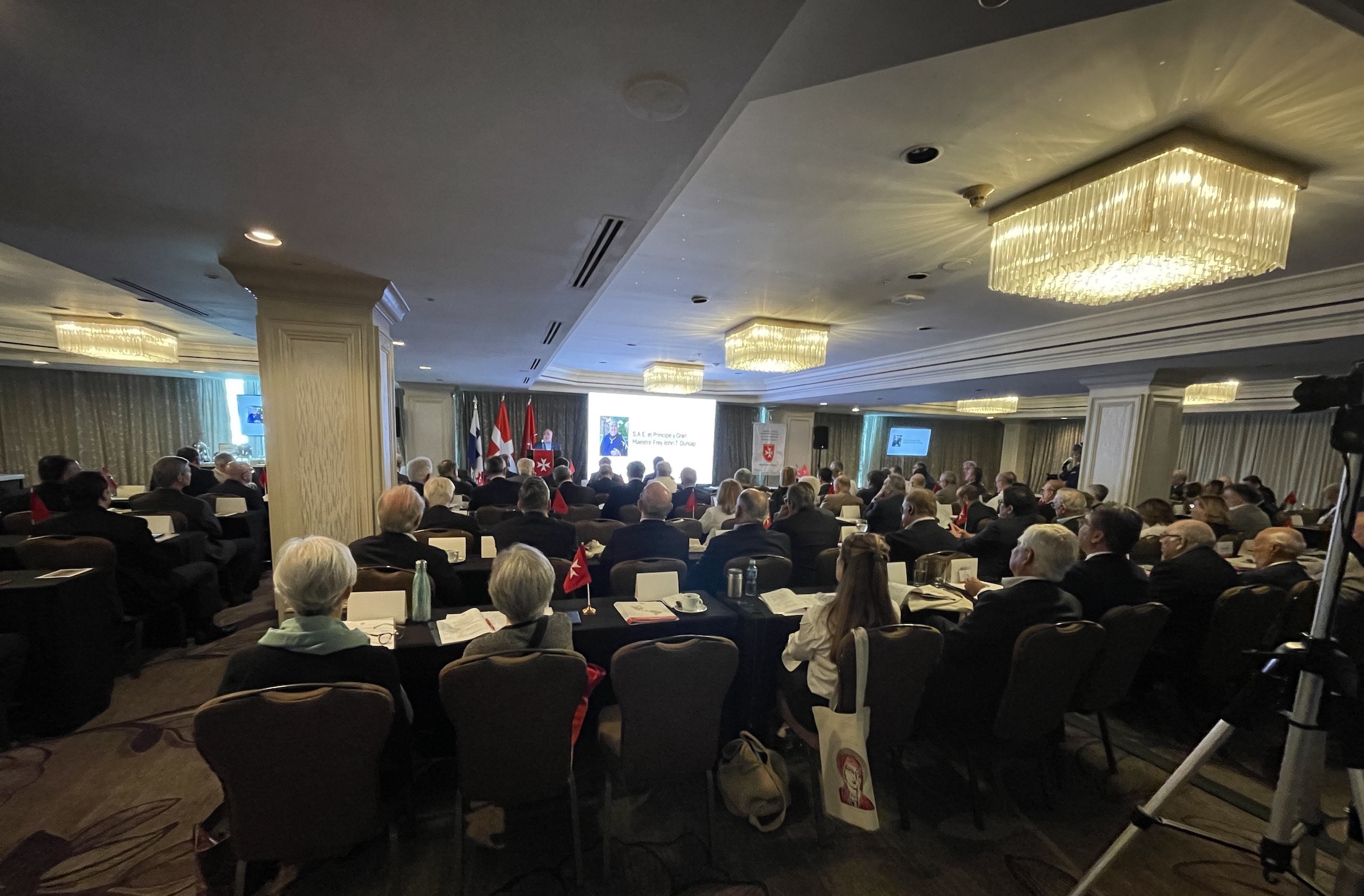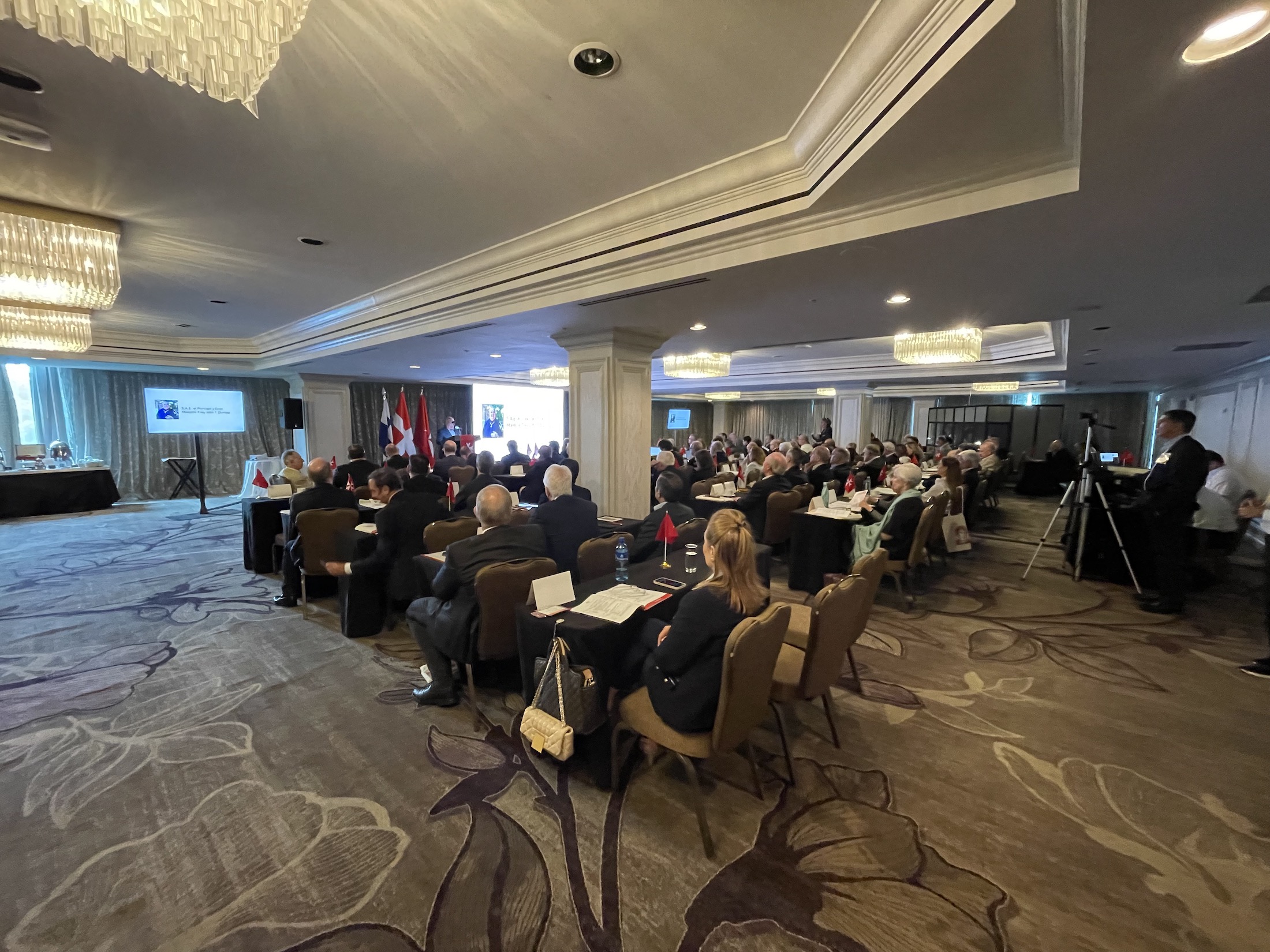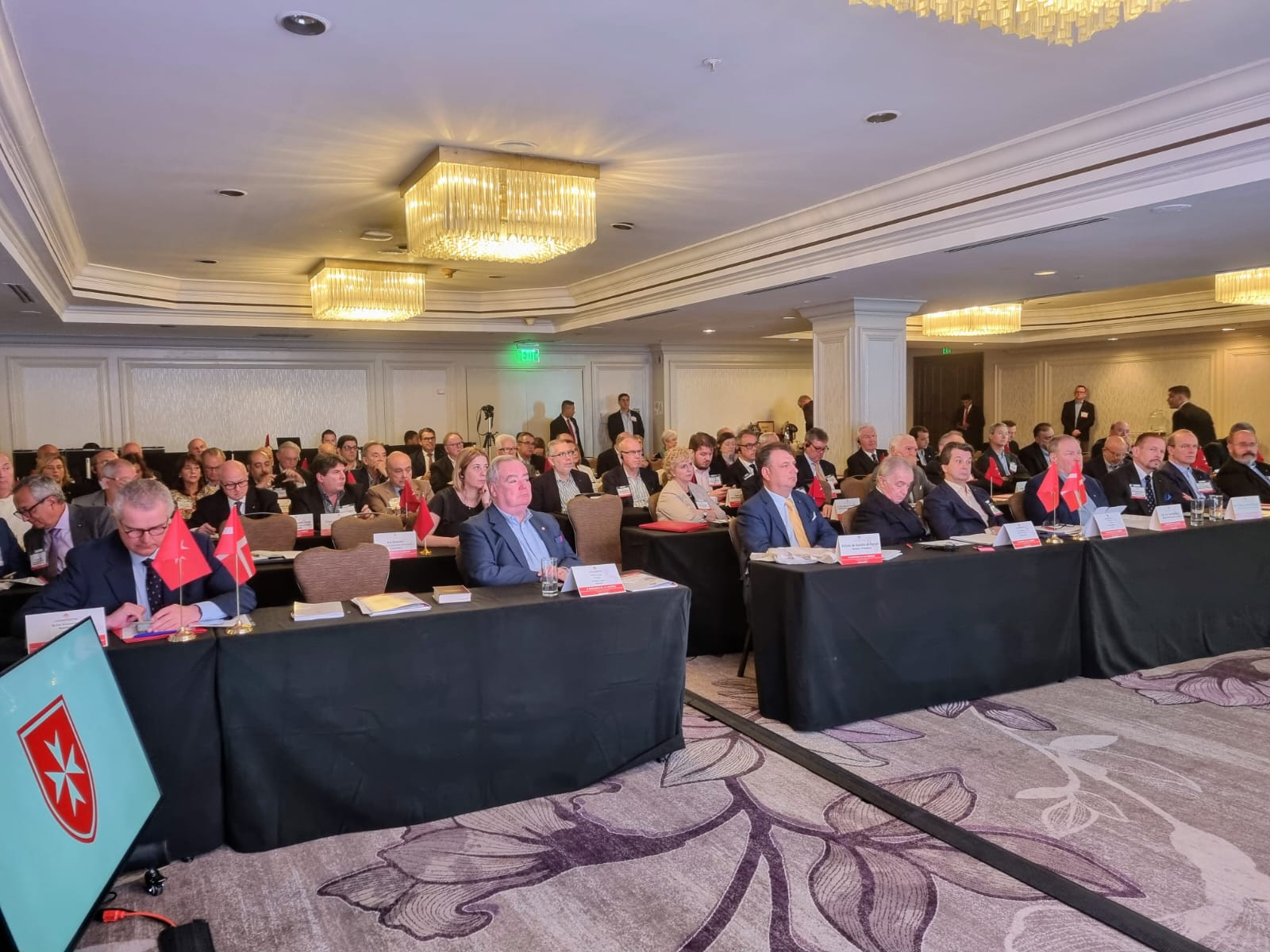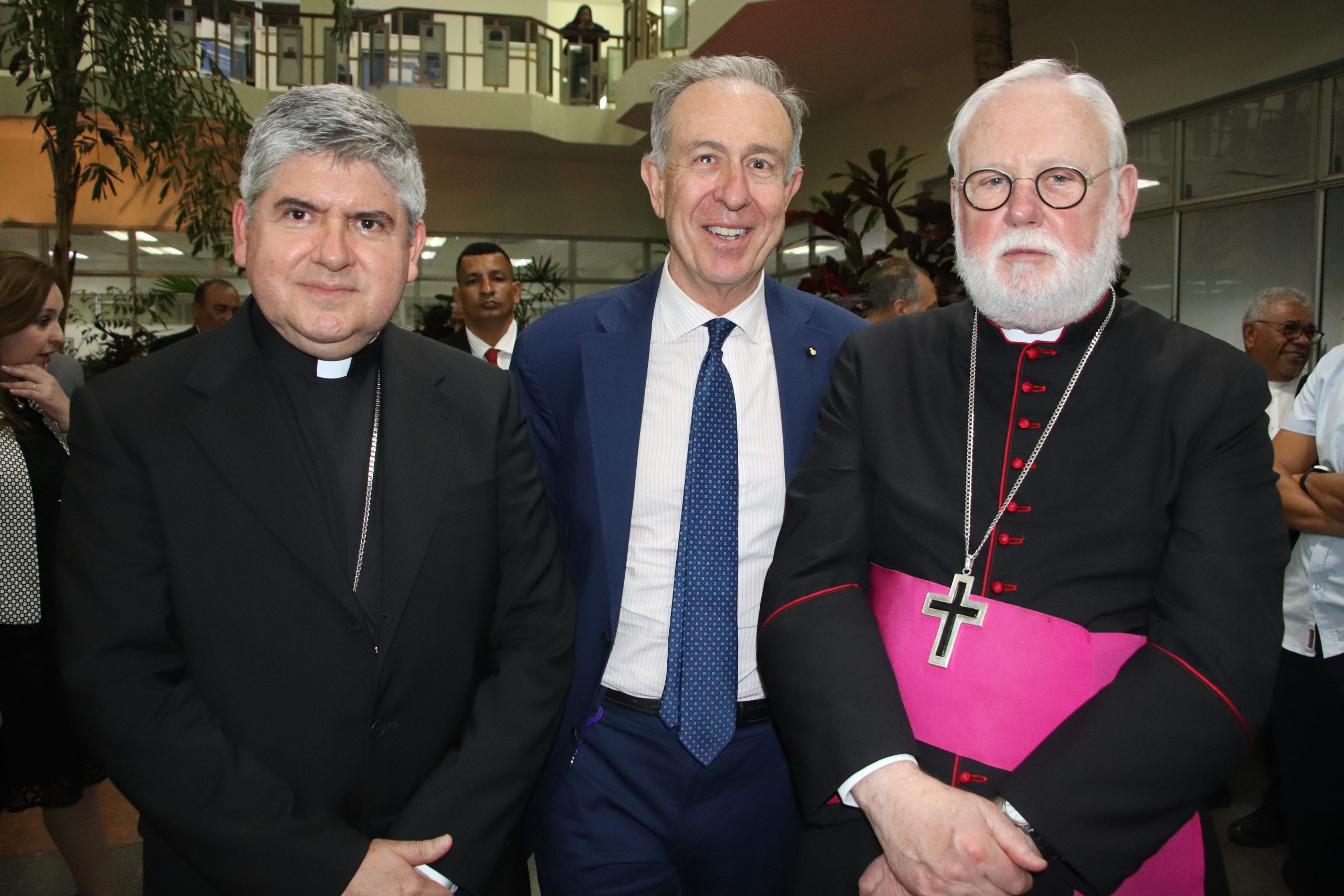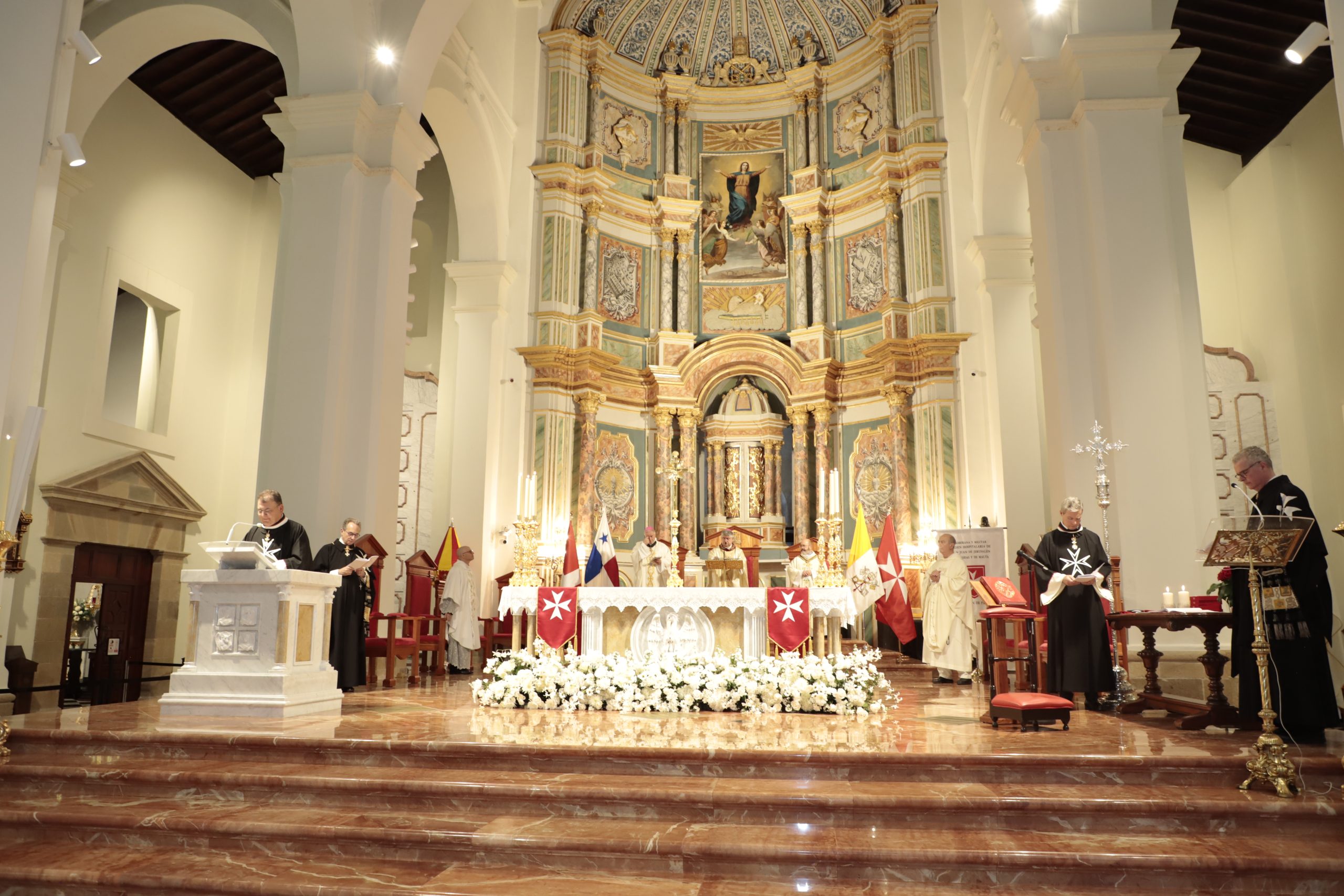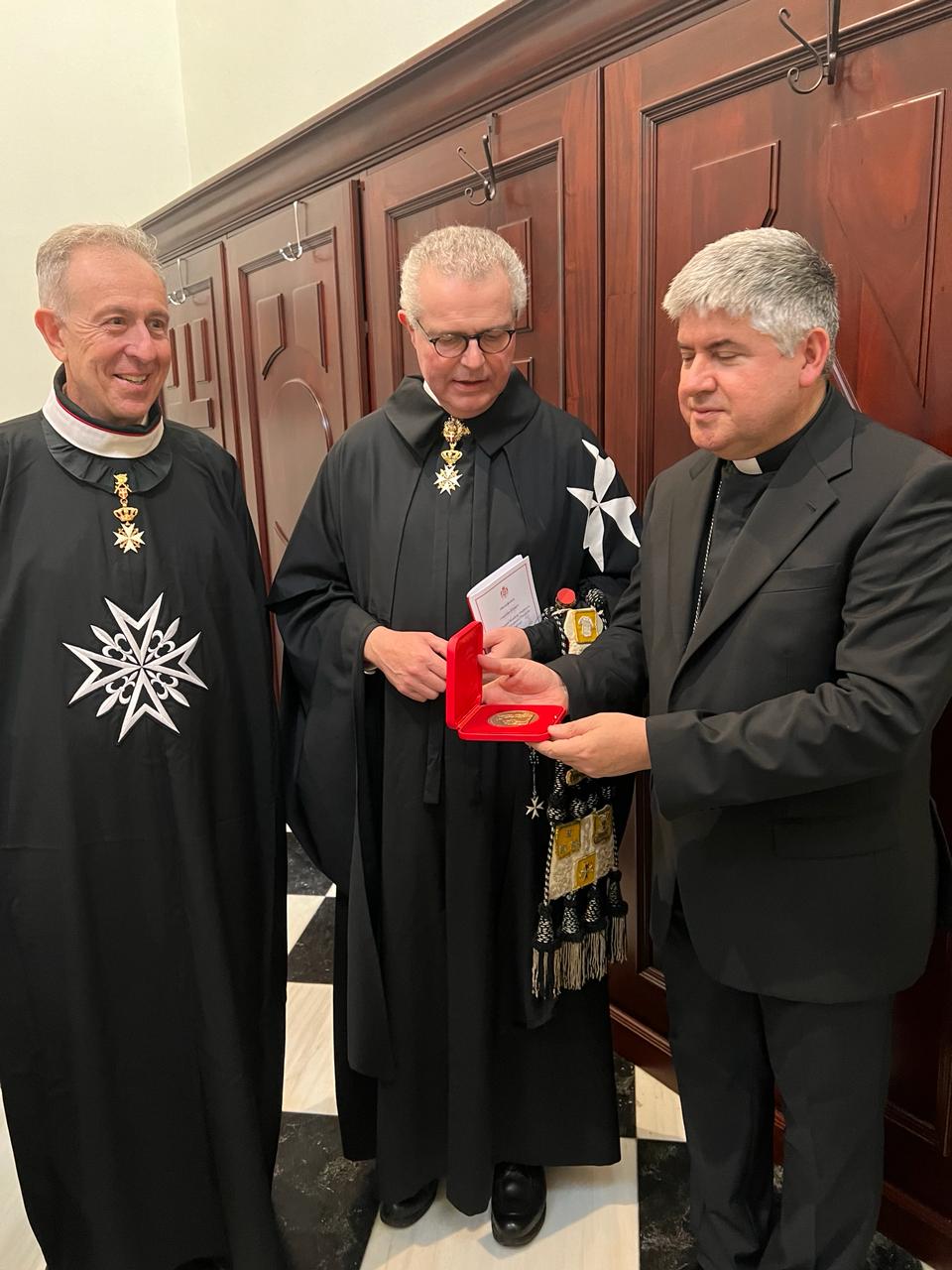Your Most Eminent Highness, Your Eminence Cardinal Ghirlanda, Your Excellency Prelate don Luis, Excellencies, dear Consoeurs, dear Confreres, distinguished guests.
I would like to express my thanks and appreciation to Ambassador Del Bono, to the President De Sanctis de Ferrari and to all Panamian members and volunteers, for the organization of this conference. We are all very impressed by the great work you have done so far, which allows us to gather today.
Moreover, I know very well that your Association is doing everything possible to increase its member and the humanitarian activities in favour who is in need.
Yesterday I met the Minister of Foreign Affaires and she thanked the Order for what you do here, and the Grand Master, in his meeting with the President of Republic, again received his thanks for our presence and our activity in Panama. Thank you so much.
I would also like to thank all of you for coming to Panama City from all the Americas. It is a clear demonstration, appreciated indeed, of your devotion to our beloved Order. I am very happy to see, gathered together, all the Entities of the Order of this Continent. This is the first time in the history of the Order.
I trust this conference will deliver a shared unified vision and strategy that will further strengthen the scope of our action and of our Christian charisma.
Before getting into the specifics of the situation of the Order in the Americas, let me illustrate a general outline of the activity of the Grand Magistry at the international level this past year and a half. It is important, because what I am saying is the effect of we do worldwide.
First of all, I would like to recall the Conference of the Ambassadors of the Order of Malta, that was held in Rome a few days ago. Sincerely I think that this Conference was important for its content and for the relevant profile of the panellist who attended it.
I wish only to underline that in my intervention I stressed that the Order has to think in terms of how to enter the third millenium. To do so, we need to understand the world as it is and as it is going to be in the near future. This, in turn, will allow the Order to better redefine its role and the way of carrying out our activities in a world that changes fast and radically.
Therefore, everything was organized with the aim of providing a broader vision of international relations and of the role the Order of Malta can play in international frame. Soon, all of you will receive the Proceedings of this Conference.
In the same frame, we are pursuing a work of advocacy on the themes that are in continuity with the historic mission of the Order, in particular the respect of the International Humanitarian Law and the protection of civilians in conflict.
Therefore, we organized an outstanding event within the Munich Security Conference on 16 February. The topic was: How to protect the protectors in case of conflicts.
Again, as well it was in Rome, very prominent personalities participated in such events in Munich: former Secretary General of the United Nations Ban ki Moon; the Prime Minister of Lebanon; the heads of the major international humanitarian agencies: the United Nations High Commissioner for Refugees; the World Food Program; the International Committee of the Red Cross; the International Organization for Migration.
Combining Rome and Monaco together, and recalling my speech in September at the United Nations Security Council, and last but not least, that every day the Grand Master meets in Rome or in every part the world several Heads of State, and that the High Charges continually meet high political personalities both from countries with which we have diplomatic relations, and with others who however know very well our humanitarian role in the world, this means only one thing.
That the Order’s credibility towards political leaders and the family of the leading humanitarian organizations, is very high. We should now go ahead on this way and collaborate with other prominent organizations with a view to bringing our themes at the level of the major international political fora.
Therefore, we can say that we are proud of what we are. And, as I said, this is a direct effect of what we do.
Therefore, we are enough strong to recognize also our weaknesses, and we are enough strong to be able to correct them.
In the third millennium, a considerable level of professionalism is required in every field, including in the field of volunteering and humanitarian activities. And not in all profile of our organization, we are in line with the standards required by the times we are living in.
I wish to share with you some concerns.
We can start by remembering our goals: obsequium pauperum and tuitio fidei. These two goals are closely connected. Helping those in need and doing it in the name of our faith and with our eyes turned to heaven, are two faces of the same coin.
Therefore, and in general terms, we must try to increase our works in the wake of our charism. But here it is necessary to have a right picture of our Order.
Our Order, over the last twenty years, and perhaps more, has grown in an unbalanced way. There are very important Associations, and other Associations that have remained essentially the same over the years. The more active Associations were certainly facilitated in this by an older tradition and more favourable context conditions, but this does not mean that a large part of our world do not move ahead.
The Order of Malta has such an history and such a profile that a more balanced growth in every part of the world and an higher level of its activities wherever it is present, cannot be an option, but a duty.
To achieve this goal, that is, to push for more balanced growth throughout our world, we have to do only one thing: to increase the structured projects we carry out.
For this purpose, several requirements are necessary. The first two are: Financial helps and a basic professional ability to prepare a project that illustrates the initiative that is requested to be financed.
For both of these two requirements, we must distinguish between small or medium projects and larger and more important ones.
For the small and medium level projects, and for what regard the financial help, I am please to announce that the Sovereign Council have just launched the new initiative by establishing the OMDP, Order of Malta – Donors for Projects.
And for what regard the professional ability to prepare a project, in the statute OMDP is foreseen a new dedicated team assigned to support embassies and associations in their efforts to elaborate projects and proposals to submit to OMDP for financing.
Moreover, this team will collaborate with the Associations and the Ambassadors along the first step of the projects. Therefore, for any project, every Entity of the Order will be helped before, during and after.
Lorenzo Borghese, who is in charge of this new structure, will go into more details during his presentation. But all of you will receive very soon a complete, short, but clear documentation for explaining the OMDP.
The new entity will bring together donations from various sources, first of all private donors but also from the strongest associations, following the principle that the rich part of the Order must help the poorer part, which is nestled in Central and South America, in Africa, in some part of the Far East or the Middle East. We are not only a State, we are for first a family.
This new fund will operate according to some basic criteria: first of all transparency, because all the important donors can appoint some representatives on the Advisory board and on the steering committee. Therefore they can evaluate any project. Secondly, OMDP will accept projects that are structured and not occasional and that can become sustainable in 2-3 years. Therefore, the projects will pay the rolling costs only for the first or a part of the second year of activity. Last, but not the least, the management cost of OMDP is substantially zero. And this is a good message and makes the difference.
Of course, in the country in which there is no Association, the Ambassadors can rely on other organizations, such as Caritas. We estimate that the average amount of a project could be around 50.000 – 100.000 euros.
But it is necessary to remember that in all poor countries and contexts, this amount can really carry out significant projects. Therefore we will help in preparing and supporting your projects that can really help all of you to increase, step by step, your presence in your countries. We have still received several projects and this is a proof tha we are on the right way.
It is clear that we expect that many projects will arrive from this part of the world to be examined by the evaluation commission. Honestly, it would be really surprising if that didn’t happen.
In short, we have closed the circle. Therefore, no Association and no Ambassador can say in the future that they didn’t know how to present a project or that they didn’t know how to get it financed..
But that is not all. As I said before, it is necessary to distinguish the small-medium projects, from the most important one.
It is evident that the Grand Magistry and the Order of Malta in general can not finance these most important projects. Maybe, the Order could give in some cases a financial help, but only a help.
In the Order, for years and years, some of our Entities, such as the MI or other relief corps, have been seeking funding for large projects in the tenders financed by the states. The Order can apply to calls for proposals and tenders issued by the United Nations agencies, the European Union and National Development Agencies.
What’s the news? that thanks to our project evaluation team in OMDP, we have also started to do the same from Magistral Palace.
Recently, for example, the Order of Malta Jordan was granted, through an Italian NGO, a financial contribution for the implementation of a project in Jordan. The amount is 700K euros! And this project was prepared thanks the work of the team I said about before. And, in these days, we are preparing three new projects to present to Italian Cooperation System. Each project involves activities worth around 1,5 millions in the average, one involve Libanon, one Uckraine and another a country in Africa: Uganda or Mozabinco.
But, and furthermore, in the case of Latin America, and always thanks to our team in Magistral Palace, we are deeping our collaboration with an intergovernmental organization, the Italian-Latin America Institute. We have invited a representative of such institute to our cooperation and she will provide, over the next few days, an illustration of how they operate and how they can partner with the Order. And we are working to obtain a financial help for restoring the clinics in San Salvador.
Moreover, we are looking forward to develop a strategy of financial diversification: private donations; important private Foundation, partnerships with charitable organizations and local non-governmental entities.
And, in this regard, the Grand Master has appointed an Ambassador at Large, very well known in financial and philanthropic community, precisely for this purpose. And personally, I am meeting and I am planning to meet, several important Foundation in Italy and in the world.
To prepare the most important project, again Lorenzo Borghese and his Commission can help, but a few days ago I met the whole MI team in Cologne and its headquarters. Very interesting indeed. Our common idea is to work together and involve the MI both in preparing and executing the most important and complex projects because they have many skills and a long experience at this regard. We had a very productive exchange of views and proposals. This means cooperation.
We have everything to be successful also in the important project because we have the know-how to prepare and execute them, we have contacts with the large foundations in the world that can finance them and we have the ability to present them to the various state entities in the world to compete for the tender.
I said at the beginning that to achieve the goal to increase our activities, it is necessary a Financial help and a professional ability to prepare a plan, a project.
We need at least three other elements: excellent communication about what we do, with the purpose to enlarge the number of donors and to increase our visibility; involvement of the highest exponents of the world’s leading class to help us in orienting our strategies and implementing our activities, and a more efficient organization in the countries where the activities ultimately take place.
Communication. From years and years, the main concern of our Order was: we have not a good communication. First of all, there is a local activity of communication and a central activity and a central strategy.
For what regard the central activity, we have – under the control of our Grand Master – a Communication Board whose vice President is Frà Richard Wolf, today here among us and to whom I wish all the best for his small physical problems, typical of young men.
This Communication Board is working for preparing a global Communication Strategy. At the same time, we have asked one of the most efficient Italian and European communication companies with great international connections to help us and Marianna Balfour who I thank you very much. And, honestly, the results are evident because our conference had excellent press coverage and so happened for the Munich conference. In short, there are all the conditions for this topic to be definitively set aside.
Unfortunately in the Order of Malta it often happens that problems become topics of conversation, rather than issues to be resolved as quickly as possible.
Finally, I can tell you that all of you – Ambassadors and Presidents of Associations – will receive a Kit of guide lines that can help you, and I can tell you that – divided by geographical area- we are organizing zoom meetings to explain how best to operate locally in this sense.
Nevertheless, I have to say something only one word to the ambassadors: website. Where this website does not exist, no information on the Embassy, its location, the name of its Ambassador, its activities etc. is available to a large audience of potential visitors, donors, local Authorities, ecc. We have two different kind of website: interactive, or, more easier, not interactive. Well, it is not acceptable that there is only one non interactive website and only almost 30 interactive website. In Rome, our Comunication Department has prepared 50 website that are not interactive. These website have only to be completed with the most important information regarding the Ambassador, the address of the Embassy and the information about the diplomatic members. The Ambassador has only to communicate these information to our communication department in Rome, and we do every thing is necessary. Well, only one ambassador communicated to Rome these information. This is by definition unacceptable, but it is unacceptable also for another reason: the side effect of these non interactive website is that all the news that regard the Central Government of the Order, automatically appear on these website.
It is evident the important effect in terms of visibility. And this is even more true for the website that are interactive. Therefore, I will ask all of our ambassador to provide this information not later than one month.
Involvement of the highest exponents of the world’s leading class. We are in the process of establishing a sort of Academy, a flexible institution that would bring together very prominent personalities from the scientific and academic communities as well as the Philanthropy and business world, with a view to providing the Order with ideas and suggestions. But not only. As you know, Vatican with its Pontifical Academy, debates fundamental issues for understanding the world that surrounds it and in which it operates. I personally met Cardinal Turkson who is the Chancellor of the Pontificial Academy of Science and the Pontificial Academy of Social Science. He explained to me the Organization and the modus operandi of these two Academies.
The Order of Malta, in my opinion, has to be aware -as well as the Vatican – of the great issues that are at attention of the world we live in, even if we cannot necessarily influence them. But with a pinch of pride, we can also add that the awareness of the great problems of current topics and the possible sharing of some of their solutions can also allow us, with our diplomatic network, our international relations and the credibility that we have gained over 10 centuries, to influence solutions and direct reflections. Moreover, the last but not the least, the members of this Academy could also help the Order in carrying on our humanitarian activities.
In this regard, we will be more specific in a near future, but for the time being I wish to anticipate that this project is being elaborated.
The last element of this puzzle, is a more efficient organization in the countries where the activities ultimately take place. And now I come to this part of the world. Here the problems are, basically three: numbers of members, their age on average and collaboration amongst our different Entities. These three problems are the premise of any activity.
Let me show you a few numbers that will enable us to put the situation into context.
Numbers. Over the past 15 years, the number of Associations and Subpriory the Americas has not increased. The Sub-Priories were created around 20 years ago.
But, in general terms, you can see that the number of Order of Malta’s members in the Latin America is very low.
It is well known that normally no more than 40/50% of our members participate and contribute to our spiritual or charitable activities. Therefore, it is not necessary to add other words and it is evident that it is crucial for these Associations, and in particular for the smallest, to increase as quickly as possible, the number of its members.
The numbers tell us that in Central and South America there are almost the 50% of the National Associations worldwide, but only the 8,23% of the entire number of members. You have in total 1090 members. You certainly agree with me that the absolute numbers over this part of the continent it is not a satisfactory number.
This bring us to a fundamental question: why in countries with millions of Catholics do we have so few members? And why you have, in several occasions, an higher number of volunteers (I have not the total frame, but only a few figures) who never join the Order?
Therefore, the time has come for each Association to decide how much it wants to grow each year, and the time has come for each of them to really commit to doing so.
In some cases it cannot be less than 10% per year, in others more, but at least let us decide today, all together, that next year we will know that the members of the Order in Central and South America have grown on average at least 10%. And so for many years to come. This is not an option, is a duty.
I am aware that – in general – we are looking for very good Catholics, with a significant record of achievements in their life, whose qualities can embody the charisma of our Order. But even considering all this, I believe that there are many opportunities to grow our membership in this region. In Central and South America, there are countries where members of the Order always represent between 0.00005 and 0.00098 percent of the Catholics living in that country. Is it ever possible?
And this reflections takes us back to a completely related question. If we do not grow in number, by definition, the Associations age.
Age. A second concern regards, therefore, the age on average. In this area of the world, in almost 15 Associations, the age on average is higher than 70 years. I sincerely think (see the slides) that the situation is “weak”!
Unfortunately, age brings wisdom, but not energy, and the activities are carried out with the physical energy that is characteristic of the young. Moreover, if the age on average is too high, even on the outside we appear with a face that is unfit to overcome the challenges that arise every day.
Furthermore, there is a clear virtuous circle between numbers of members, age, activities, attractiveness, and new members. The more activities are carried out, the more new young energies are involved, and greater is the possibility that some young energies will join the Order.
I am well aware of the difficulties you are faced with on the ground and therefore we believe it is important that a strong initiative comes from the Grand Magistry. And – as I said – we are trying to do everything possible, but without your help and without your commitment, nothing will happen.
And the same words I could utilize for the activities of our Ambassadors. We need Ambassadors who reside as much as possible in the country where they are accredited, but we also need Ambassadors who really want to add to their diplomatic work a strong collaboration with other entities of the Order to facilitate humanitarian activities.
Our Ambassadors have to cooperate with our Associations or other Order of Malta’s entities where they exist. And if these entities of the Order do not exist, collaborations could be structured with the Apostolic Nunciatures – which must in any case be contacted by the Ambassadors – or other Catholic partners.
Moreover, the members of the diplomatic staff have to know the country of accreditation very well and can truly collaborate with the Ambassador to carry on his diplomatic and humanitarian activities.
Therefore, the new Ambassadors, before appointing them, will be asked a detailed program on all these points.
In conclusion, we know that our Ambassadors are volunteers and that they already do many important things, and we are aware that many Association in some part of the world, have to face with many problems, but the ambassadors and the associations have a challenge to face.
To represent something that is worthy of our history and the complex times we live in, or to remain on the sidelines.
This is a common challenge. And honestly our history, the values we represent, and the respect we enjoy, cannot, even in theory, admit that we can remain in several part of the world, on the sideline, on the bench.
Two final observations.
First, in the American continent the Order is also keen to expand further its hospitaller and humanitarian engagement at a transnational level for the advantage of the local populations and communities which share common identities that overcome national boundaries. Thus, the relevance for the Order to be involved and present within regional organizations.
In 2015 we were successfully admitted as Extra Regional Observer of SICA, the Central American Integration System. Obtaining such result also with the OAS, the Organization of American States, would open interesting prospects of structured and articulated social and humanitarian cooperation throughout the region.
To reach such goal, I encourage Embassies and Associations to work in coordination with me and the Secretary General for Foreign Affairs in a strategic lobbying effort with respect to the authorities of the OAS member states to which you are accredited or you reside in as they will be the ones to vote the admission of our Sovereign Order as OAS Permanent Observer.
The second information regards the new Constitution. There is a Commission that is working hard to publish the Regulations and Commentary as soon as possible. This will be an important tool for the correct understanding of our Constitution and Code. Therefore, whoever has doubts about how to implement or interpret the Constitution and the Code, please write as soon as possible: we will submit to the Commission any problem that is reported to us.
Dear friends, we have many projects on the table: we want increase the number of our Professi, the heart of our Order, we want increase our humanitarian activities and our presence in the world, we also aim to increase the number of our diplomatic relations adding to our list that already includes 60% of the member States of the United Nations, other countries as Unite States, Mexico, Canada, India, and so on, we simply want to be worthy of our history and our charisma. And together, we can do all this. We can have success.
Once again, thank you for your service to the Order and for being here today. As you can see, the topics under discussion and the challenges we face are numerous and considerable, but I am sure that with the help of our Lord and the spirit of cooperation that has always characterized these conferences, we can achieve together significant results in the name of the Order of Malta and to the benefit of those in need.
Thank you.
May God bless our Order, you, and our families.
